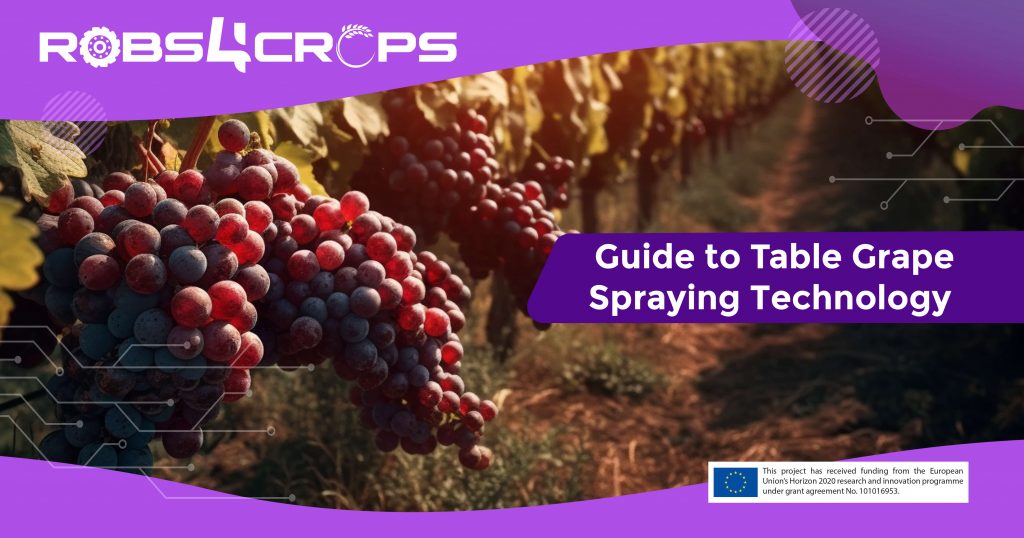Table Grape Spraying Technology Definition
As its name suggests, table grape spraying technology refers to smart farming solutions that automatically disperse chemicals on table grapes while being calibrated to a set of regulations that ensure the spraying is sustainable and cost-saving.
The Challenge in Spraying Table Grapes
The process of growing table grapes efficiently is not without its hurdles. Different problems arise frequently. One of the prominent ones is the fact that applying different preventive treatments to the grapes through the season has to be done in a timely and efficient manner. This further leads to a headache for those looking for workers to spray the grapes, as there needs to be a sufficient number of them, leading to possibly high expenses.
Why are Table Grapes So Popular With Consumers?
Table grapes are full of health benefits for us. Packed with nutrients, including fiber, potassium, Vitamin K, Copper, they even bring in a moderate amount of Vitamin C. They also have high water content and natural sugars, making them a refreshing and satisfying snack.
A key component of grapes is resveratrol, an antioxidant found primarily in the skin of red grapes. Resveratrol helps protect the body from oxidative damage, promoting overall health. Additionally, the nutrients in grapes are believed to offer protection against cancer, eye disorders, cardiovascular issues, and other health conditions.
Groundbreaking Recent Changes in Table Grape Spraying Technology
As part of the EU-funded Robs4Crops project, the consortium of this project is developing and testing a fully autonomous robot system aimed at making crop spraying more sustainable. One of the testing grounds for this system is through a Pilot on Greek farms that focuses on table grapes. Table grapes are highly coveted in Greece for their exceptional quality and unique flavour, making them a vital crop for the local agricultural economy.
This effort gives hope for the table grape market in the EU to move away from the dire global picture of table grape growing, as the 2023-24 table grape season has been dubbed “difficult”. The need to modernise EU table grape growers is immediate as, per the United States Department of Agriculture (USDA), table grape imports to the EU are projected to climb by 57 thousand mt to 630 thousand mt, thanks to reduced output and increased demand.
The Greek pilot leverages advanced technology to optimise the spraying process for these valuable grapes. The pilot employs cutting-edge technology including a retrofitted tractor, a CEOL robot, a Perception Unit, a Hydraulic System, a Terminal, and an AGC Box. The Perception Unit is particularly crucial, enabling autonomous spraying by detecting when vine leaves reach the necessary density.
Starting in 2023, the team conducted spraying trials in a 0.46-hectare commercial field, comparing autonomous and conventional methods. Throughout the piloting process, they encountered several challenges such as perfecting the Perception Unit, dealing with delayed robot arrivals, technical issues during spraying, managing speed control, and requiring human supervision. Despite these obstacles, the team’s perseverance resulted in significant advancements in autonomous control and data communication.
More About the Robs4Crops Project
Robs4Crops, a 4-year Horizon 2020 project led by Wageningen University and Research, took on the mission of revolutionising agricultural robotics. To be more precise, it aims to develop a labour-saving and fully autonomous robotic system. By focusing on precision tasks such as weeding and spraying, it aims to significantly reduce the necessity to hire workers for such harsh activities. Overall, by being supported by a consortium of 16 partners from 8 countries, Robs4Crops is committed to transforming European agriculture with smart implements, autonomous vehicles, and advanced planning software.
For more about Robs4Crops, follow us through our Newsroom or on our Linkedin page.

